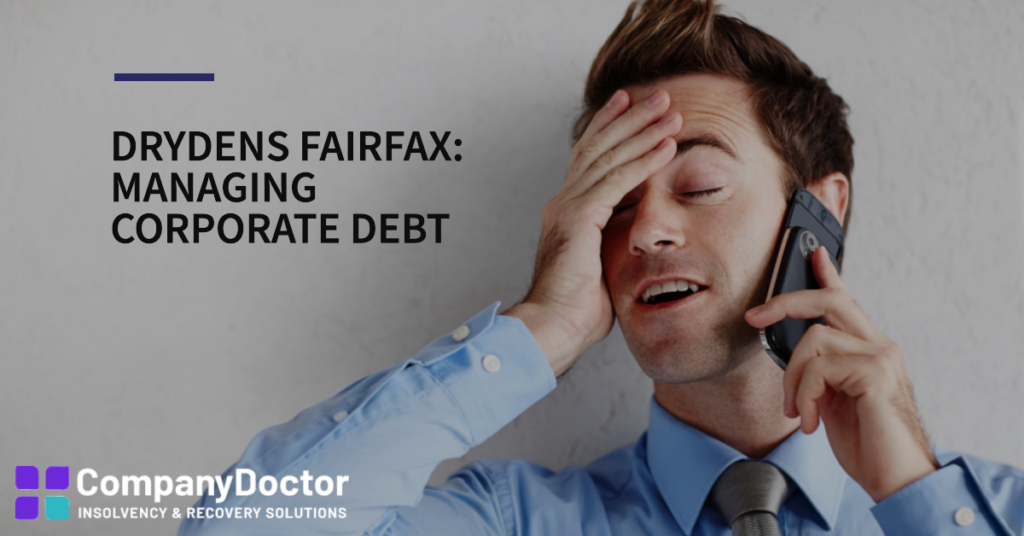It’s not uncommon for businesses to encounter various entities that play a role in the debt recovery process. One such entity that you might come across is Drydensfairfax Solicitors. As a business owner, it’s crucial to understand who they are, what they do, and how they operate, especially if you find yourself dealing with them.
Drydensfairfax Solicitors is a UK-based law firm specialising in debt recovery. They work on behalf of creditors, including banks, credit card companies, and other financial institutions, to recover outstanding debts. If you’ve received a letter or a call from Drydensfairfax Solicitors, it’s likely because they believe you or your business owes a debt.
This article aims to provide a comprehensive understanding of Drydensfairfax, their operations, and how to handle their debt recovery processes. We’ll delve into the specifics of dealing with commercial debts, focusing on limited companies rather than individual consumer debts. We’ll also discuss whether you should pay the debt and what to expect when dealing with Drydensfairfax.
Whether you’re a business owner trying to navigate the complexities of commercial debt or a director of a company facing financial difficulties, this article will equip you with the knowledge and insights you need to handle interactions with Drydensfairfax Solicitors effectively and confidently.
Quick Links
Understanding Drydensfairfax: What are they and how do they operate?
Drydensfairfax Solicitors, often simply referred to as Drydens, is a law firm based in the United Kingdom that specialises in debt recovery. They are a trading name of Drydens Ltd, a company registered in England and Wales. Drydensfairfax operates within the legal framework of England & Wales and is regulated by the Solicitors Regulation Authority (SRA).
Role and Operations
Drydensfairfax Solicitors acts on behalf of creditors, which can include banks, credit card companies, and other financial institutions, to recover outstanding debts. If you’ve received a letter or a call from Drydensfairfax, it’s likely because they believe you or your business owes a debt.
Their role involves contacting the debtor or company, which in our context would be a limited company, to inform them of the outstanding debt and to arrange for its repayment. This is usually done through letters, emails, or phone calls.
If the debtor fails to respond or settle the debt, Drydensfairfax may escalate the matter to court. However, it’s important to note that not all debt cases end up in court, and many are resolved through negotiation and payment plans.
Freephone including all mobiles
Handling Commercial Debts with Limited Companies
When dealing with commercial debts involving limited companies, Drydensfairfax follows a specific process. This process begins with the issuance of a formal ‘Letter Before Action’ (LBA) to the debtor. The LBA outlines the details of the debt, including the amount owed, the creditor, and the terms for repayment.
If the debt is not settled following the LBA, Drydensfairfax may initiate legal proceedings. This could involve filing a claim in the County Court, and if the judgement is in their favour, they may take further action such as instructing bailiffs or applying for a winding-up petition against the company.
Legislation in England & Wales
Drydensfairfax operates under the legislative framework of England & Wales, which provides guidelines and regulations for debt recovery practices. They are regulated by the Solicitors Regulation Authority (SRA) and adhere to the standards set by the Financial Conduct Authority (FCA). They are also members of the Credit Services Association (CSA), further demonstrating their commitment to ethical and professional debt recovery practices.
In the next section, we’ll delve into the debate surrounding Drydensfairfax debts and whether or not you should pay them.

Debating Drydensfairfax Debt: Should you pay?
In this section, we will discuss whether you should pay your debt to Drydensfairfax or not. This decision is not straightforward and depends on several factors. Here is a visual representation of the process:
The first step is to consider various factors such as the amount of debt, your financial situation, and the potential consequences of non-payment.
This leads to the debt evaluation stage where you assess the implications of not paying the debt. Non-payment can lead to additional charges, damage to your credit rating, and potential legal action.
If you decide to pay the debt, the next step is to negotiate a payment plan with Drydensfairfax. This involves agreeing on the amount to be paid and the payment schedule. Once the terms are agreed upon, you enter into a payment plan agreement with Drydensfairfax that outlines the agreed-upon amount and the dates for making payments.
Remember, it’s important to seek professional advice before making any decisions about debt repayment. If you’re unsure about anything, don’t hesitate to reach out to a debt advice service or a licensed insolvency practitioner.
Drydensfairfax: What to expect and how to handle it?
If your company finds itself in a situation where it cannot afford to pay the debt owed to Drydensfairfax, it’s crucial to handle the situation carefully. Here’s a revised timeline that focuses on this scenario:
Remember, every situation is unique, and it’s important to seek advice tailored to your company’s specific circumstances
- Initial Contact: Drydensfairfax will contact your company regarding the debt. It’s important not to ignore this communication. Instead, respond promptly and professionally, explaining your company’s financial situation.
- Assessment: Assess your company’s financial situation in detail. This includes reviewing your cash flow, assets, liabilities, and potential avenues for raising funds. If the assessment confirms that your company cannot afford to pay the debt, it’s time to seek professional advice.
- Seek Professional Advice: Contact a licensed insolvency practitioner or a debt advice service. They can provide guidance on the best course of action, which may include negotiating a payment plan, entering into a Company Voluntary Arrangement (CVA), or considering insolvency procedures.
- Negotiation: If possible, negotiate with Drydensfairfax. They may be willing to agree on a reduced payment plan or even write off some of the debt, especially if the alternative is your company going into insolvency.
- Resolution: Depending on the advice you receive and the outcome of negotiations, you may enter into a payment plan, initiate a CVA, or start insolvency procedures.
Remember, every situation is unique, and this timeline is a general guide. Always seek professional advice tailored to your company’s specific circumstances. If you need assistance, don’t hesitate to contact us at Company Doctor. As licensed insolvency practitioners, we can provide advice and solutions for struggling directors with insolvent companies. Call us on 0800 169 1536 or leave an enquiry on our website.
Frequently Asked Questions
Who are Drydensfairfax Solicitors?
Drydensfairfax Solicitors are a UK-based law firm specialising in debt recovery. They work on behalf of creditors, including banks, credit card companies, and other financial institutions, to recover outstanding debts.
What should I do if my company is contacted by Drydensfairfax?
If your company is contacted by Drydensfairfax, it’s important not to ignore the communication. Respond promptly and professionally. If your company is unable to pay the debt, seek professional advice from a licensed insolvency practitioner or a debt advice service.
Can Drydensfairfax take my company to court?
Yes, if a debt is not paid, Drydensfairfax can initiate legal proceedings on behalf of the creditor. This could potentially lead to a County Court Judgement (CCJ) or a winding-up petition against your company.
What if my company can’t afford to pay the debt?
If your company can’t afford to pay the debt, it’s important to seek professional advice. Options may include negotiating a payment plan with Drydensfairfax, entering into a Company Voluntary Arrangement (CVA), or considering insolvency procedures.
How can Company Doctor help?
Company Doctor is a team of licensed insolvency practitioners based in Leeds. We offer advice and solutions to directors struggling with insolvent companies. We can guide you through the process of dealing with commercial debts, including negotiating with creditors like Drydensfairfax. You can reach us at 0800 169 1536 or leave an enquiry on our website.
Conclusion
Dealing with commercial debts can be a daunting task, especially when faced with the prospect of dealing with a debt recovery law firm like Drydensfairfax Solicitors. However, understanding their role, operations, and the legislation that governs their actions can help you navigate this challenging situation.
We’ve discussed the factors to consider when deciding whether to pay a debt and the implications of not doing so. We’ve also highlighted the importance of seeking professional advice, particularly if your company is unable to pay the debt.
Remember, ignoring the problem won’t make it go away. Instead, take proactive steps to address the issue. Whether it’s negotiating a payment plan or considering insolvency procedures, there are options available.
If your company is struggling with insolvency, don’t hesitate to reach out to us at Company Doctor. As licensed insolvency practitioners, we can provide the advice and solutions you need. We specialise in helping directors navigate these challenging situations, offering services such as Creditors’ Voluntary Liquidations. Contact us today at 0800 169 1536 or leave an enquiry on our website. We’re here to help.
Remember, every situation is unique, and it’s important to seek advice tailored to your company’s specific circumstances.
References
The primary sources for this article are listed below.
drydensfairfax customer payment portal | How to Make a Payment
SRA | Solicitors Regulation Authority | Solicitors Regulation Authority
Details of our standards for producing accurate, unbiased content can be found in our editorial policy here.

